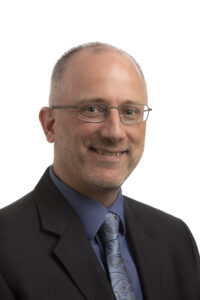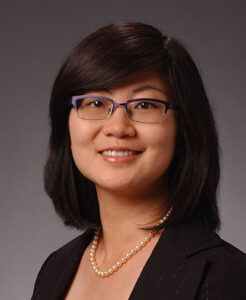Pharmaceutical sciences faculty awarded patents
- May 3, 2024
- By: Libby Maness
- Our People
Two members of The University of North Texas Health Science Center at Fort Worth’s College of Pharmacy faculty have made significant strides in their respective fields. Dr. Kyle Emmitte, an expert in medicinal chemistry, and Dr. Jin Liu, specializing in computational drug design, joined forces on a project which showed potential in treating certain types of cancer. Their efforts culminated in a patent approval, validating the efficacy of their computational approach in molecular design.
To complete their work, they also worked alongside former faculty member Jack Wang, a renowned cancer biologist. Through a meticulous process combining wet lab chemistry with molecular modeling, they designed novel molecules with the potential to hinder cancer progression. After rigorous testing and validation, their findings were published in the prestigious British Journal of Cancer.
 Reflecting on the significance of their work, Emmitte emphasized the journey from discovery to patent issuance.
Reflecting on the significance of their work, Emmitte emphasized the journey from discovery to patent issuance.
“The project that led to this patent is a great example of the power of interdisciplinary team science,” Emmitte said. “Quite simply, none of us could have reached the end goal of the project without relying on each other’s unique skill sets and contributions.”
While the publication marked a milestone, obtaining a patent signifies the recognition of their novel discoveries and the potential intellectual property they represent. It’s a testament to their commitment to pushing boundaries and translating scientific breakthroughs into tangible solutions.
 Dr. Jin Liu has another patent approved for the improved CRISPR-Cas9 technology for genome editing. Both patents hold immense promise for the future of health care. Emmitte and Liu’s innovations pave the way for novel therapeutic interventions, offering hope for patients battling cancer and genetic diseases. The potential impact extends beyond academic accolades and provides promise for those in need of better treatment options.
Dr. Jin Liu has another patent approved for the improved CRISPR-Cas9 technology for genome editing. Both patents hold immense promise for the future of health care. Emmitte and Liu’s innovations pave the way for novel therapeutic interventions, offering hope for patients battling cancer and genetic diseases. The potential impact extends beyond academic accolades and provides promise for those in need of better treatment options.
“These patents not only embody years of hard work and dedication, but also hold the promise of revolutionizing treatment for genetic disorders,” Liu said. “The potential to cure diseases like cancer, sickle cell anemia and possibly even HIV is profoundly motivating.”






Social media